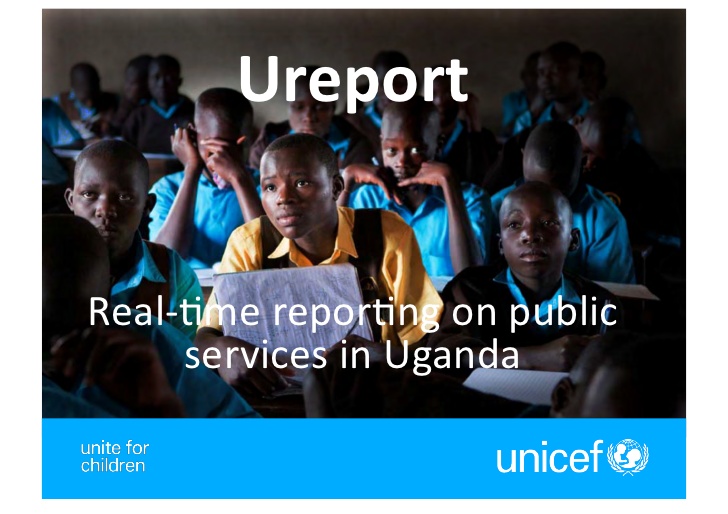Posting this here, but it appeared originally on my organizations’s site here. It is more development related, but I see great potential in these seemingly simplistic, readily accessible projects built from simple SMS to be highly relevant to mobile learning anywhere, another example of how the developed can learn from the developing world. A good user experience is critical, for sure, but think about networks like reddit and the onslaught of texting-based social media emerging throughout the world: Telegram (which I am using and like), KakaoTalk in Korea (where I am based), and others. Texting isn’t going anywhere; it remains a viable, immediate, and trusted channel for communication. It has its own contours and eccentricities, its own culture that must be respected, but we can build responsive citizen engagement initiatives from within it, as this post describes in regards a UNICEF project: Ureport.
Before diving in, though, it might be a good idea to mention that m-government or e-government tools (e-democracy tools, digital government, or any other handle they are given) are everywhere and occasionally they are so ubiquitous that we might not even know they are or draw attention to them by giving them a proper name. They can include but are not exclusive to politics; they span the spectrum on issues of concern for the government and the services it provides its citizens.
Start at the easiest, most readily accessible point: polling. Appraising the citizen voice on issues related to voting, to citizen and community policing, to managing and appraising communication between government and contractors, to municipal waste disposal even. From there, you can branch out into the programs themselves, to communication and dissemination of necessary information, to building trust and transparency. And that is really what is about, building trust and transparency. Trust in the government to provide the services that matter most to its citizens; transparency in holding them accountable for doing just that by making their operations public and open to scrutiny. Mobile technology provides us an accessible means for doing this routinely and broadly across most demographics (but not all). So we look at one project in particular to illustrate this: Ureport.
Ureport is a free SMS-based system that allows young Ugandans to speak out on what’s happening in communities across the country, and work together with other community leaders for positive change. UReport consists of weekly SMS messages and polls to and from a growing community of Ureporters, regular radio programs that will broadcast stories gathered by Ureport, and newspaper articles that will publish stories from the Ureport community. So it is communicating through some of the most readily available technologies on the planet: radio and SMS. As it directed at younger Ugandans, it revolves around texting. People can join simply by texting a number, they can participate simply by texting a response or initiating a discussion. It has approximately 300,000 members, a decent number of which are engaged and discussing. 14,016 Responses out of 265,376 Participants (5%) answered the most recent poll question: Do you know of any Deaf child or youth in your community who has never been to school?
Poll results are mapped by region to demonstrate areas with greatest need. The poll results are publicly available (transparency) and the government can (or at least should) use these results to direct services efficiently (marshalling limited resources) and effectively (towards impact). It holds the government accountable, to some degree, by making it all public; the need has been expressed and the expectation is that it will be addressed. All the results from previous polls are publicly available and can be shared via social media. Trending topics are assembled into a highlights page: the National Pulse.
There are other UReport instances (Nigeria, Liberia, etc.) out there as it is fairly portable (a good thing), as well as similar initiatives in emerging economies as well as established ones, like DemocracyOS, Balbis, and Delib, and expert guidance and toolkits on how to get started with these from UNESCO and ITU (International Telecommunications Union), among others. These can be put together using any number of SMS applications (FrontlineSMS, among others). There is no mystery in these and their simplicity is their greatest strength. They do what all good ICTs should do and what some applications forget with their sophistication: put people together and get out of the way. Amplify the strengths of the collaboration, provide support and expertise when needed, and let them direct their own future. And if you think simple polling doesn’t matter, consider one of the questions themselves:
Where do women in your community go to get antenatal care?
Citizen engagement and robust, responsive governments begin right here: answering the need for basic services like this and reliable guidance on where they are. For engaged communities, for healthier and informed citizens, for more robust governments. One text at a time.
